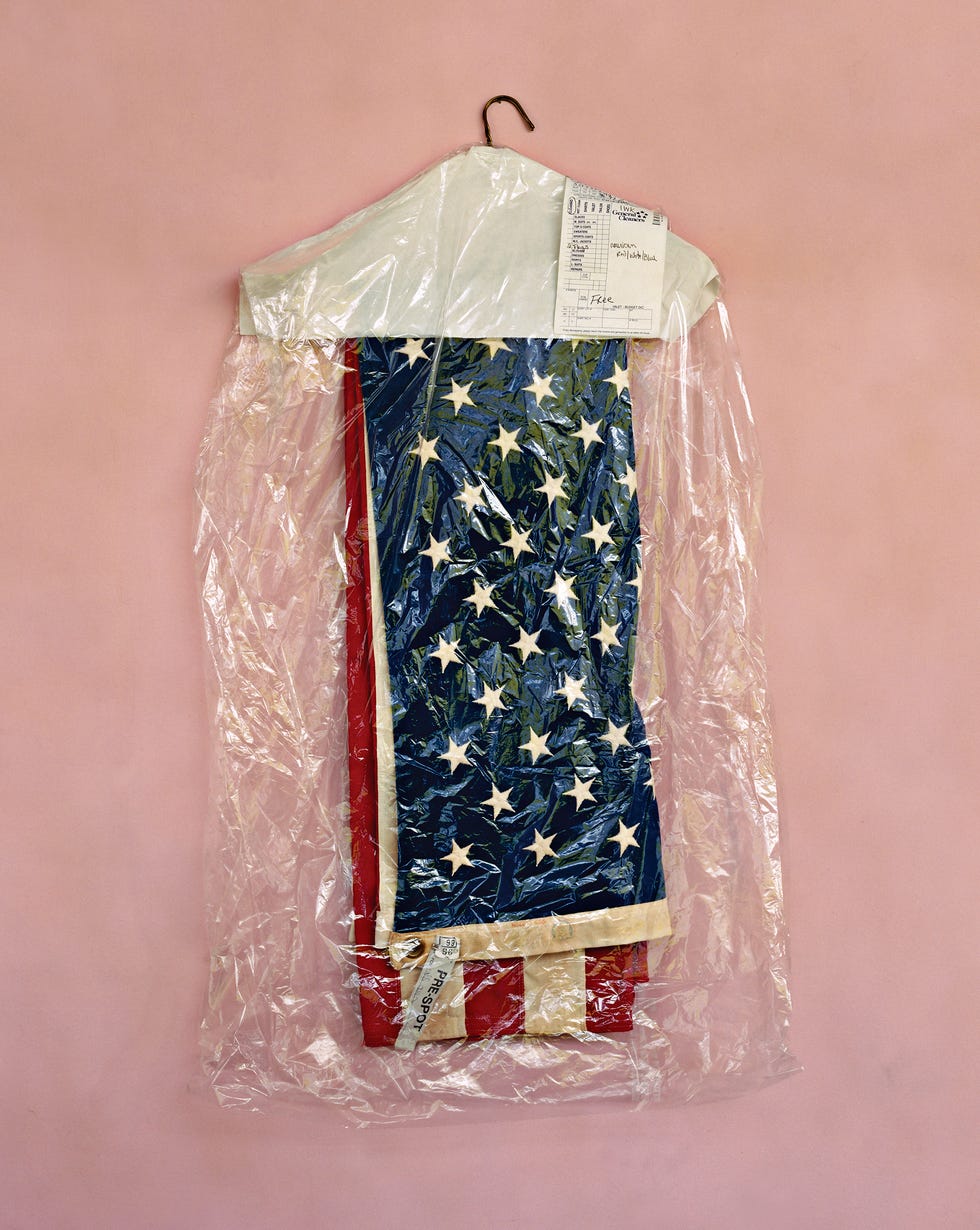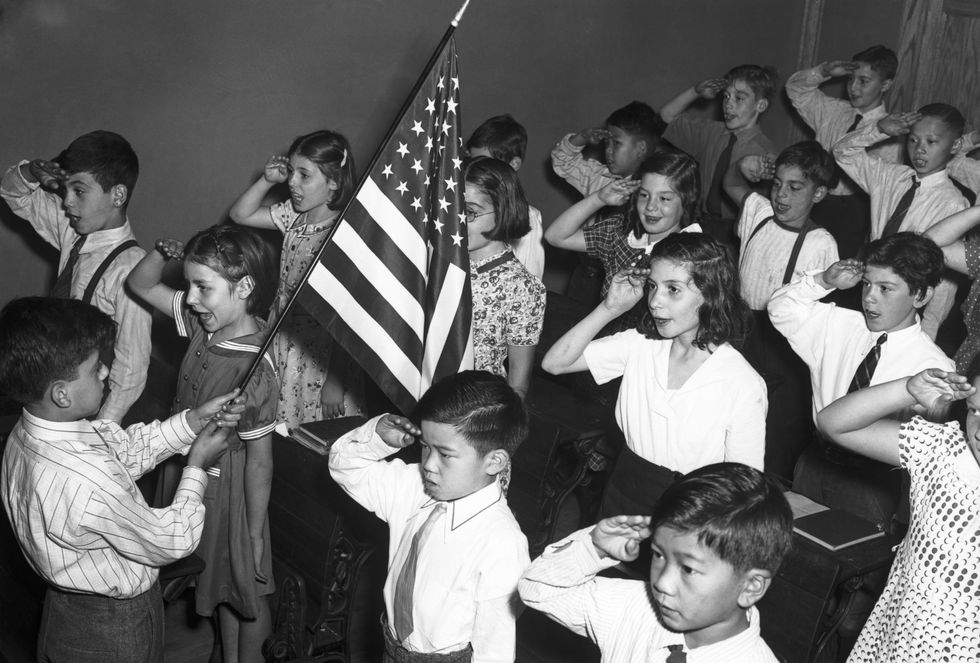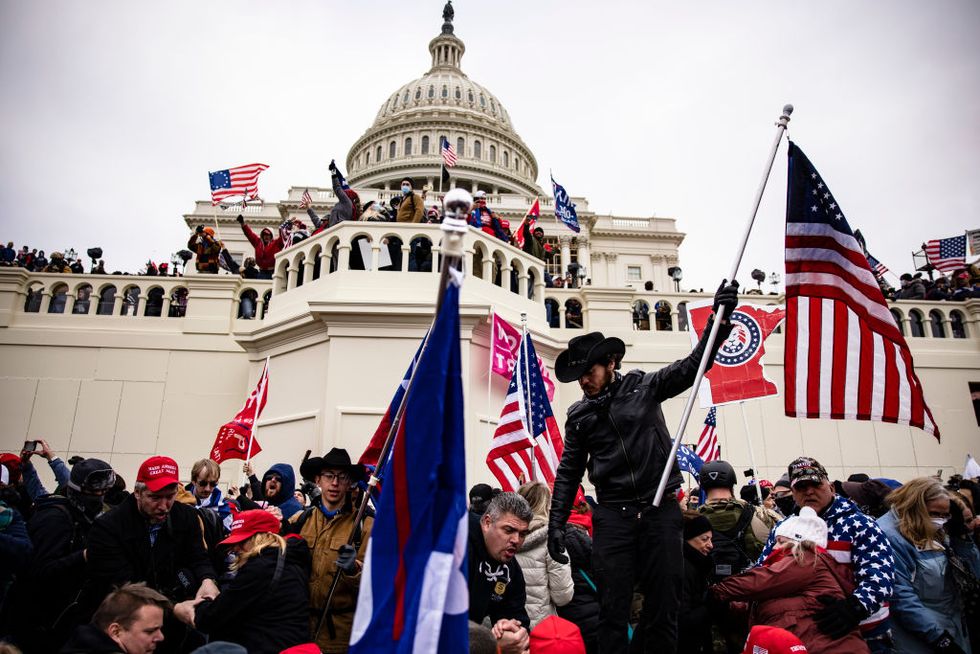For Whom Does the American Flag Fly?
I’m in no hurry to wave it, but don’t tell me I don’t love my country.

You couldn’t not notice it: a multitude gathered one morning at an A gate of Phoenix’s Sky Harbor Airport, waving little American flags, recording on their cell phones, laying a soundtrack of exuberant cheers. Intrigued or just nosy, I stopped for a look-see, noticed that walls behind the gate desk were adorned with red-white-and-blue bunting, that other walls featured a slogan saluting all those who serve and their families, that the area was also bedecked with flags: an American flag along with those representing the Army, Navy, Air Force, Marines, Coast Guard, even the one for POW/MIA. Yonder, an agent stood at the mouth of the Jetway and called out the deplaning passengers as if announcing the Suns playoff starters: “From the U. S. Air Force staff . . . !” “From the U. S. Navy . . . !” “Electronics technician first class . . . !” First-class petty officer . . . !” “USS Mission Bay rank third class . . . !” Given their hoary hair, their wrinkled mugs, and the fact that some of them caned out of the jet bridge or were pushed in a wheelchair, I surmised that all who exited had earned the honorific of veteran.
It heartened me to see that kind of appreciation for our veterans, so much so that I dawdled past my first urge to leave, so much so that I joined in rounds of applause. Though my enthusiasm was sincere, truth be told, it was also tempered. Matter fact, had somebody tried to hand me a little mini flag, I might’ve refused it and for damn sure would’ve been reluctant to wave it.

Well, because while I believe it commendable and crucial to honor the people who’ve risked or made the ultimate sacrifice for their/our country, my relationship to the flag is at best complicated, at worst ruined.
The year after it declared independence, the Continental Congress passed the first Flag Act, solidifying the Stars and Stripes as the symbol of America, even boasting that the 13 stars on the Betsy Ross version represented “a new constellation.” The second Flag Act, in 1794, provided for 15 stars and 15 stripes (the famous Star-Spangled Banner that inspired Francis Scott Key) to rep the newest states. Of course, the good old U. S. of A. kept right on manifesting its destiny, a mission that also made for some awkward designs.
In 1818, Congress passed the third Flag Act, legislating that it would return to the original 13 stripes to represent the colonies but would add a star for each new state. That third act didn’t specify a design for the stars, and that vagueness led to the production of several versions, that is until 1912, when an executive order by President Taft prescribed not only the order of the stars but the proportions of the flag. Two more executive orders, both by President Eisenhower in 1959, further specified the arrangement of the stars, the later one establishing the design of our current flag.
The vexillologists would have me believe the red of Old Glory symbolizes “hardiness and valor”; its white “purity and innocence”; its blue “vigilance, perseverance, and justice.”
While I accept those qualities as its symbolic ideals, I also believe that the quiddity of the flag is a question: Who belongs in America?
Which is a query evermore inextricable from who owns America.

Given the centuries that we were chattel, the long rule of Jim Crow, and the machinations fueling mass incarceration, I can say with certainty that it ain’t been my peoples. Nonetheless, given Native American pogroms and the Indian Removal and Relocation Acts; given Japanese internment; given the hundred-year-plus crusade for women’s suffrage and the leaked intent for SCOTUS to nullify Roe v. Wade; given the extant rampant schemes of voter suppression and the proliferation of ardent anti-LGBTQ legislation; given the border wall and the inhumanity of brown babies in cages; given the forging of the wealth gap and the cruel persistence of health disparities; given, given, the givens . . . the answer to that essential question is that it might not have been your people neither.
And furthermore, during the fascistic previous administration, the Americans most visible and vocal about their belonging and ownership were the ones hell-bent on using the flag as a cudgel against anybody deemed an other and/or as a scythe to cleave division.
And let me add that, often, they’re the same ones proclaiming themselves true patriots.
In George Orwell’s classic essay “Notes on Nationalism,” he defines patriotism as “devotion to a particular place and a particular way of life, which one believes to be the best in the world but has no wish to force on other people” and defines nationalism as “the habit of identifying oneself with a single nation or other unit, placing it beyond good and evil and recognizing no other duty than that of advancing its interests.” Orwell acknowledges that there’s often little distinction between the two and yet argues that “patriotism is of its nature defensive, both militarily and culturally” but “nationalism, on the other hand, is inseparable from the desire for power.”

In addition to being grounded in America’s complicated history, my resistance to revering the flag—and other symbols of American virtue—is fueled by the belief that Orwell’s distinctions may no longer exist, that the middle ground is now a chasm, that we’ve atrophied into (or maybe we’ve just been exposed as) an era in which nationalism, of a sort indistinguishable from jingoism, has by and large subsumed the patriot.
But I also concede that my perspective has been colored by what’s made the news—the vehemence over Colin Kaepernick’s kneeling; the tiki torchers threatening, “You will not replace us”; the MAGA insurgents, many clad in patriotic colors, rioting through the halls of the Capitol—and that there are also plenty of Americans who believe this country capable of achieving the ideals enshrined in its founding documents and symbols, whose hoisting of a flag outside their crib won’t make the headlines but who are just as important, if not more important, to defining and extending its virtues.
One such acolyte is a buddy of mine—he identifies as a white guy, which seems essential to mention—who says he’ll continue to raise a flag out of respect and duty, that he isn’t about to let the KKK/Proud Boys/Oath Keepers/Three Percenters of the world usurp its meaning. His arguments, I admit, make a helluva lot of sense.

But for me? Could the flag ever belong to me and mines? Would it ever be a fitting emblem of our experience? Can we—those who belong to groups coerced into a hyphenated lower class of Americanness—have any lasting impact on its significance?
My buddy asked if I intended to raise a flag outside my house this Fourth of July, and I said no—said it quick, too—and then the very next instant worried whether that decision would make me less American, less deserving of the mythic American dream of prosperity, somehow less worthy of experiencing the highest potential of this place where I was born and, in all likelihood, will die.
A week or so after I stumbled upon the celebrated arrival of a planeload of veterans, I returned from another trip and stopped by the very same gate. That day, there was no excited crowd, no gate agent broadcasting names, no veterans strolling or limping or wheeling off the jet bridge. However, still—the slogan honoring those who served. Still—the patriotic bunting. Still—the beaucoup flags along the walls. All of them inanimate, inert, waiting for someone to come along and imbue them with consequence.

Trump's Team Of Rejects Will Lead Us To Disaster

Enemy of the Interior Picked to Run Interior Dept.

These Bribery Charges Smell a Little Funny to Me

Congratulations to ‘The Onion’ on Its New Purchase

Matt F*cking Gaetz???

UFOs, Please Take Me with You

Trump’s Plans for Migrant Families Are Horrifying

My Life As a Homeless Man in America

Rahm Emaneul for DNC Chair? Seriously?

It’s Not a Trump “Mandate”

Let’s Take a Peek at Trump’s Hiring Spree

Did Marcellus Williams Die an Innocent Man?
Home — Essay Samples — History — American Flag — What the American Flag Means to Me: A Reflection

What The American Flag Means to Me: a Reflection
- Categories: American Flag
About this sample

Words: 557 |
Published: Sep 1, 2023
Words: 557 | Page: 1 | 3 min read
Table of contents
A symbol of unity, a beacon of freedom and opportunity, the spirit of resilience, in conclusion.

Cite this Essay
To export a reference to this article please select a referencing style below:
Let us write you an essay from scratch
- 450+ experts on 30 subjects ready to help
- Custom essay delivered in as few as 3 hours
Get high-quality help

Verified writer
- Expert in: History

+ 120 experts online
By clicking “Check Writers’ Offers”, you agree to our terms of service and privacy policy . We’ll occasionally send you promo and account related email
No need to pay just yet!
Related Essays
1 pages / 620 words
2 pages / 770 words
1 pages / 363 words
1 pages / 1157 words
Remember! This is just a sample.
You can get your custom paper by one of our expert writers.
121 writers online

Still can’t find what you need?
Browse our vast selection of original essay samples, each expertly formatted and styled
Related Essays on American Flag
National symbols play a pivotal role in representing a nation's identity, values, and history. They serve as powerful visual and symbolic representations of a country's collective ethos, serving as unifying symbols that inspire [...]
The American flag, with its striking red, white, and blue design, has long been a symbol of the United States of America. It waves proudly in front of government buildings, adorns homes and businesses, and is displayed at [...]
Being a ubiquitous symbol of the United States, the American flag evokes a myriad of emotions and interpretations, ranging from pride and patriotism to dissent and protest. Its history, interwoven with the nation's triumphs and [...]
Flags have long been potent symbols of national identity, patriotism, and unity. They represent the values, history, and aspirations of a nation. However, the act of burning a flag, particularly a national flag, is a profoundly [...]
The flag of the United States represents many things that current citizens may never be aware of during their lifetime. The history of our flag is remarkable as that of the America Republic. The origin of the flag up until this [...]
Flags have served as powerful symbols of identity, unity, and patriotism. The American flag, with its vibrant colors and iconic stars and stripes, holds a special place in the hearts of millions of Americans. It represents the [...]
Related Topics
By clicking “Send”, you agree to our Terms of service and Privacy statement . We will occasionally send you account related emails.
Where do you want us to send this sample?
By clicking “Continue”, you agree to our terms of service and privacy policy.
Be careful. This essay is not unique
This essay was donated by a student and is likely to have been used and submitted before
Download this Sample
Free samples may contain mistakes and not unique parts
Sorry, we could not paraphrase this essay. Our professional writers can rewrite it and get you a unique paper.
Please check your inbox.
We can write you a custom essay that will follow your exact instructions and meet the deadlines. Let's fix your grades together!
Get Your Personalized Essay in 3 Hours or Less!
We use cookies to personalyze your web-site experience. By continuing we’ll assume you board with our cookie policy .
- Instructions Followed To The Letter
- Deadlines Met At Every Stage
- Unique And Plagiarism Free

IMAGES
VIDEO